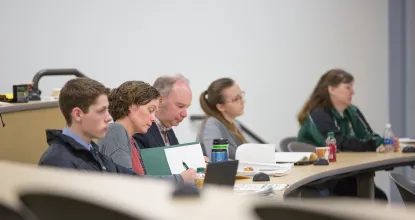| Year | Academic Department |
| 2022-23 | Biology, College of Business, Engineering Technology |
| 2023-24 | Social Work, School of Nursing, History, Mathematics and Computer Science |
| 2024-25 | SELPS, Political Science, LLIS, Criminal Justice |
| 2025-26 | Chemistry, School of Clinical Sciences, English, Theater and Dance, Sociology and Anthropology |
| 2026-27 | Art and Design, TOS, Physics, Communication and Media Studies, Philosophy, Music |
| 2027-28 | Psychological Sciences, EEGS, School of Health and Human Performance, Economics, CNAS |
as of October 2023
Departments to be reviewed shall be notified prior to the completion of the Winter term of the preceding academic year. A department may commence with the self-study procedure at any time after receiving notification of APR. Refer to the full Guide, a separate document available from the same folder holding this Guide document.
| Year 1 | |
| April |
Provost: Provost reminds dept. heads, EPC, and Institutional Research (IR) which suite of departments should begin the self-study process. Provost and Dept: Provost meets with those departments to discuss the APR process and priorities for that department. |
| Summer |
Provost: IR prepares enrollment and student performance data tables required in the self-study. Data is sent to departments for interpretative narrative. Dean and Dept: The Dean, Dept. head, and departmental APR coordinator meet to discuss the nature of the self-study and any significant issues that must be addressed, any variations in the template and a budget for external review. Dept: Departments begin gathering data. |
|
Early |
Dept: Departments continue gathering data for self-study tables. Needs for additional data are identified and resources become available for obtaining it. |
|
September- |
Dept: Departments draft a self-study that contains departmental information and information specific to each of the majors in the department. |
| November |
Dean and Dept: By November 15 Dean and Department review the preliminary self-study. Dept: Department makes any modifications to their self-study following the review Dean and Dept: Develop a list of potential external reviewers. |
| December |
Dept: By December 1 Departments submit the self-study and the list of possible external reviewers. Provost and Dept: Provost (or designee) may request a meeting with departments for a preliminary review of their self-study. Dept: Department makes any necessary modifications to their self-study following the review with the Provost, if applicable Provost: Provost selects reviewer(s) from provided list by December 5. Departments are provided resources to bring in one or more external reviewers as warranted by the mix of majors. Reviewers are contracted by the end of fall semester. |
| January | Reviewer: External reviewers receive finalized self-study and other relevant information to review before their visit. |
| January- February |
Reviewer: External reviewers examine the modified self-study, visit campus, have an exit interview with the Dept. Head, Dean/Provost, and send a written evaluation to the department within three weeks after the visit. |
| March |
Departments: Draft an addendum to the self-study that comments upon the external review. For graduate programs, GPC will also comment on the external reviewer’s evaluation. A completed self-study, external reviewer’s evaluation and addenda are submitted to EPC. |
| April | EPC: EPC reviews documents then drafts a formal set of recommendations to send to the Provost and department in response to the documents they have reviewed. |
| Year 2 | |
| Summer | Provost: Provost outlines any major areas for improvements or modifications in resource allocation. |
| August- September |
Dean and Dept: Dean and department develop and send to the Provost a plan to implement recommendations and achieve goals. |
| October | Provost: Provost formally signs-off on the plan. |







